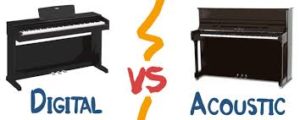How to buy a piano for a beginner: My Top 5 Things To Consider By Donna Harris © 2021

1) Where are you in your interest level? Are you trying it out?
If so, then, a small keyboard might be the best starting option. I would recommend a minimum of 61 keys, which will enable you to begin taking piano lessons.
Just be aware that within eighteen months or two years, you will need to upgrade to a full 88 key piano or keyboard to go past beginner repertoire and to get the most out of your piano lessons.
How long you take to move beyond 61 keys will depend on how fast you learn and what kind of music you wish to learn. Classical music often requires expanding octave access as you progress. Other kinds of music like pop music may not.
So, your desired choice of music can also influence what kind of keyboard would be your best bet.
2) Buy to suit your home environment and needs. Acoustic or digital piano?
Do you have lots of space? Do you need to control the volume due to close by neighbours ? Do you need portability? If you have room and don’t need to worry about your neighbours, you might go with an acoustic piano, especially if you want to learn classical or jazz pieces.
Versatility of volume control and size makes a digital piano a great choice. Again, your desired choice of music is good to know here. If you want to learn popular music, a digital piano is a great choice because it comes with a range of instrument sound options with which to experiment.
3) What is your budget?
When buying a piano or keyboard, budget will guide your choice but consider the first two points first, as prices vary regardless of your choice being acoustic or digital. Don’t be misled by budget. You want to make the best choice for where you are now. New acoustic pianos often cost more than new digital pianos. However, new digital pianos can easily cost twice as much as a second hand acoustic piano!
4) Sound quality: polyphony.
High polyphony provides better sound quality, which is what you need to play the varying lengths of notes that music has. It is also important to have high polyphony for when you play chords and/or play music using sustain pedal, if you select a keyboard that has pedals, which is optional. Aim for a high polyphony above 100. The lowest number is 32, which is too low. The highest polyphony is around 250.
Talk to retailers for more guidance about particular models.
5) Sensitivity of keys: get weighted keys.
This is very important as far as determining what instrument you are buying because a “keyboard” is technically not the same instrument as a piano, particularly if it does not have “weighted keys.”
To have a piano experience, you need to buy a keyboard with weighted keys, that means when you hold a key down, the sound lasts for an extended length of time, rather than ending instantly like a keyboard. You need weighted keys to have control over how you play music. Avoid keyboards that do not have weighted keys. Digital pianos mimic acoustic pianos.
Places you may try for a suitable piano or keyboard for lessons in the UK are Yamaha, Normans, Amazon, and Musicroom. There are also independent piano shops selling second hand pianos and keyboards to consider too.
In fact, such shops sometimes offer you the option to rent an instrument before making a final decision. So, you may want to consider plans regarding that. Happy shopping!
Here is an article if you would like to see some of the benefits of taking piano lessons and music in general.
